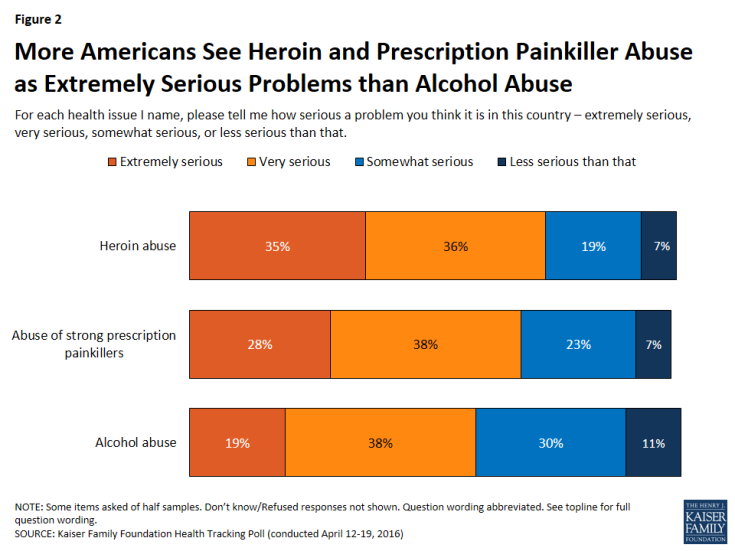In a dramatic sign of the scope of the opioid crisis, a new survey on health shows that 44 percent of Americans personally know someone who has been addicted to prescription painkillers.
About a quarter of those people say the person they know is an acquaintance, 21 percent say it’s a “close friend,” 20 percent say it’s a family member and two percent say they themselves are addicts.
Related: As Heroin Addiction Grows Like a Cancer, Obama Orders New Health
At the same time, a majority of Americans complains about a lack of access to substance abuse programs and says that Congress isn’t moving quickly enough to pass new programs to address the crisis and save lives, according to the tracking poll conducted by the Kaiser Family Foundation.
The newly released survey found that Americans view heroin and opioid addiction as among the top most serious public health issues of the day, along with cancer, contaminated drinking water, obesity and lack of access to mental health treatment. And more than 60 percent of those interviewed last month say that the government needs to do more to halt the epidemic of heroin and painkiller abuse that is claiming tens of thousands of lives.

The findings come as the House and Senate struggle to negotiate legislation to address the mounting crisis, while Democratic presidential candidates Hillary Clinton and Sen. Bernie Sanders and Sen. Ted Cruz of Texas, a Republican candidate, have raised the issue repeatedly on the campaign trail.
“I think the opioid epidemic crosses all lines,” Clinton told MSNBC on Tuesday following a campaign event in Charleston, West Virginia, where several people shared their personal experiences with addiction crisis. “It is found in the most affluent of neighborhoods and families and among the most distressed neighborhoods and families. It really knows no boundaries.”
Related: The Rapidly Rising Death Toll of the Heroin Epidemic
“I really hope that as a nation we will do much more on changing the way we treat people who are addicted – moving more into treatment and recovery,” she added. “And looking for ways to change prescription practices by physicians: being ready to help with overdoses and diverting people into drug courts -- a really good idea.”
While it wasn’t until the campaign began to heat up last year that the problem drew national attention, drug overdose is the leading cause of accidental death in the U.S. In 2014 alone, there were 47,055 reported fatal drug overdoses. Central to the epidemic is opioid addiction, which resulted in 18,893 deaths in 2014 linked to prescription pain relievers and 10,574 overdose deaths related to heroin.
In March, President Obama unveiled new steps and funding to broaden medical treatment and assistance for millions of people addicted to heroin and prescription painkillers.
When it returns from its latest recess next week, the House is scheduled to vote on nearly 20 separate bills that – among other things -- would allow some opioid prescriptions to be partially filled, to create an interagency task force to review physicians’ prescribing practice, and efforts to promote the use of naloxone, a drug designed to reverse the effects of an overdose.
Senators push protections for opioid-dependent parents, infants
The Senate has already approved a bill authored by Sen. Rob Portman (R-OH) to try to counteract opioid abuse by significantly reducing the supply of dangerous prescription drugs and promoting therapeutic alternatives.
While the House and Senate eventually must reconcile their differing approaches, the biggest obstacle –as usual—is finding sufficient funding. House Democratic leaders have been pressing for $600 million to underwrite the anti-opioid efforts, but they complain that Republican leaders are dragging their feet on reaching a compromise.
“Republicans have been unwilling to come to the negotiating table,” Rep. Steny Hoyer of Maryland, the second ranking House Democrat, said at the American Hospital Association's annual member conference. “Obviously policy without the ability to implement them are somewhat empty words.”
Related: The New War on Heroin Has Only Just Begun
The Kaiser April Tracking Poll indicates that many Americans want Congress to act before the November election. However, a majority of those interviewed also believe that physicians who prescribe painkillers could do a lot more to reverse the surge in overdosing on painkillers and other prescription medicine.





